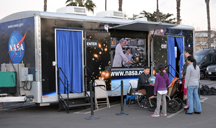NASA, space station officials to visit Purdue
April 21, 2014
 |
|
NASA's Driven to Explore mobile unit will be making a stop on the Purdue campus April 30. (NASA photo) |
WEST LAFAYETTE, Ind. – Officials from NASA and the nonprofit entity that manages the International Space Station's U.S. National Laboratory will visit Purdue University on April 30 to meet with faculty and students.
Marshall Porterfield, director of Space Life and Physical Sciences at NASA headquarters, will give a public talk at 10 a.m. in Pfendler Hall, Room 241. Porterfield, on leave as a Purdue professor of agricultural and biological engineering and horticulture and landscape architecture, will talk about "Biological Engineering Challenges in Supporting Human Exploration Beyond Low Earth Orbit." A question-and-answer session will follow.
Life and work aboard the space station are highlighted in a NASA mobile exhibit that will be on display from 10 a.m. to 4 p.m. on the Purdue Mall near the Materials and Electrical Engineering Building. The display provides information about the International Space Station's research and resulting benefits to humanity, potential future human space missions and long-duration space travel. The exhibit also includes a 4-billion-year-old moon rock - one of only eight in the world that visitors can touch - brought back aboard Apollo 17 in 1972.
The Driven to Explore mobile exhibit is part of Destination Station activities in the Indianapolis area as the agency shares the accomplishments, promise and opportunities for research aboard the International Space Station.
Porterfield played a key role in a Purdue "SporeSat" experiment that will test how plant cells sense and respond to different levels of gravity. The experiment is expected to launch in coming months aboard a SpaceX Falcon 9 rocket from Cape Canaveral, Fla., after an April 14 launch was scrubbed due to a helium leak.
Being able to grow plants for food in microgravity and space environments is crucial for long-term space exploration. The work is led by Jenna Rickus, an associate professor in Purdue's departments of Agricultural and Biological Engineering and Biomedical Engineering, and postdoctoral research assistant Amani Salim. Porterfield developed lab-on-a-chip technology for SporeSat's "BioCDs" to be used in studying fern spores.
Also visiting Purdue are Cynthia Bouthot, director of business development at the Center for the Advancement of Science in Space (CASIS), and Patrick O'Neill, marketing and communications manager for CASIS. The space station allows researchers and students to perform experiments in microgravity, an ideal environment for specialized studies in fields ranging from biology to physics.
While on campus, the officials will meet with faculty members from the colleges of Agriculture, Veterinary Medicine, Engineering, Technology, Science, Pharmacy, and Health and Human Sciences, as well as administrators from other university offices. They will also observe student projects in zero-gravity flight experiment classes conducted by Steven Collicott, a professor in the School of Aeronautics and Astronautics.
Writer: Emil Venere, 765-494-4709, venere@purdue.edu
Source: Marshall Porterfield, 202-358-2456, d.marshall.porterfield@nasa.gov
